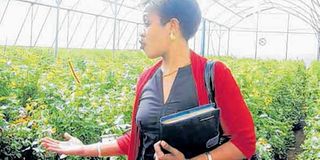Tanzania's horticulture industry gets new lease of life

Taha Group CEO, Ms Jacqueline Mkindi,
Dar es Salaam. The Tanzania Horticultural Association (Taha) and the government have breathed a new life into the horticulture industry after bringing in a cargo plane to ferry high-value horticultural products to international markets in the wake of the ‘Covid-19’ outbreak.
Owing to the Covid-19 emergency, the horticulture subsector encountered a major air transport hurdle in exporting perishable products to international markets as most of the global airlines stopped flying.
Taha - working in partnership with the government, Kuehne+Nagel, the Kilimanjaro Airport Development Company (Kadco), National Aviation Services (Nas) and development partners - took steps to secure reliable air cargo services to save the horticulture industry from collapsing. “Today, we are extremely happy to witness our dream come true as air cargo services to ferry our horticultural crops to overseas markets is here - and will be coming twice a week,” the Taha Group CEO, Ms Jacqueline Mkindi, said at the reception of the maiden Ethiopian Airways cargo plane at the Kilimanjaro International Airport (Kia) on April 9, 2020, oozing exuberance!
“Taha’s struggle to bring the Ethiopian plane is in line with President John Magufuli’s directive tobuild our economy,” Ms Mkindi said, adding: “We are responding not only to the President’s call, but also to save a key economic industry from crumpling due to the coronavirus epidemic.”
The Ethiopian Dreamliner cargo plane landed at Kia at midnight, and airlifted 28 tonnes of fruits, vegetables, spices and herbs to Belgium from where they would be ferried to other European countries.
Ethiopian Airlines required the availability of a minimum of 15 tonnes of cargo to do the job in these difficult times. But Taha’s logistics company, TahaFresh Handling Ltd, was able to raise 28 tonnes for the maiden flight.
“We are now confident of exporting more than 55 tonnes of horticultural products every week to international markets, earning the country nearly $200,000 in foreign currency,” Ms Mkindi said, pleading with other horticultural exporters to make use of this rare opportunity, particularly now when high-value horticultural exports elsewhere have declined .
Availability of cargo flights to Europe, America, Asia and the Middle East comes as a relief to investors as horticultural investors can now resume operations, thus saving jobs for about 51,000 Tanzanians in the industry’s value-chain who, together, have a direct impact on the lives of over 297,000 dependants. It also means that Tanzania would be able to reduce reliance on neighbouring airports to export perishable crops.
“We are grateful for the support from our Agriculture minister, Mr Japhet Hasunga, and his deputies, Mr Hussein Bashe and Mr Omary Mgumba, not only for horticultural development, but also in helping to secure the Ethiopian Airways’ cargo services,” Ms Mkindi stated - adding that the top ministry officials have been supportive in addressing key challenges with an eye to boosting horticultural productivity and marketing access.
Ms Mkindi also saluted the EU, IFAD, AgriCord and FFD for their material, technical and moral support in addressing the challenge of cargo flights amid the coronavirus pandemic.
The Taha Group CEO was also grateful to the Tanzania Private Sector Foundation’s chairperson, Ms Angelina Ngalula, for being supportive in finding a solution when the Namanga border was closed by Kenya due to the coronavirus malady.




